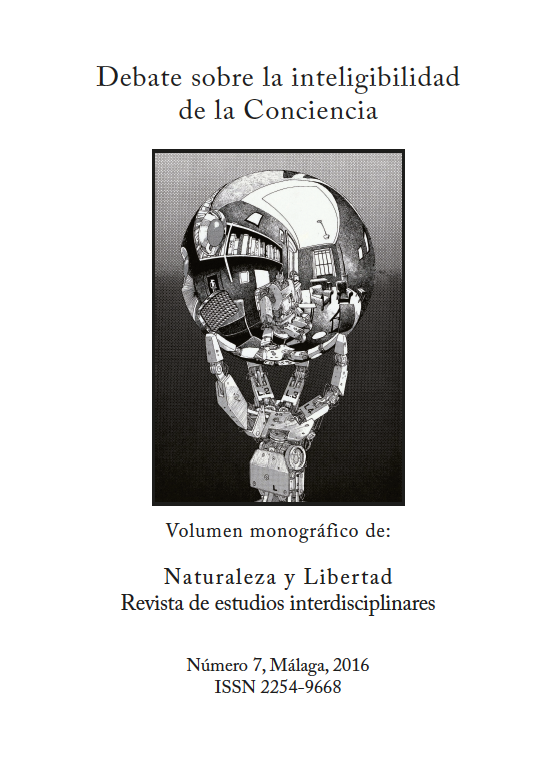¿Es necesaria una teoría de la conciencia?
DOI:
https://doi.org/10.24310/NATyLIB.2016.v0i7.6357Keywords:
teoría, conciencia, mente, alma, naturalismo, reduccionismoAbstract
La conciencia es una realidad, a la vez, natural y elusiva, y, en consecuencia, de difícil trato. Existe un problema adicional que es el que se produce como consecuencia de tratar de hacer que el estudio de la conciencia entre dentro de marcos que resultan singularmente inadecuados, incapaces de dar cuenta de las cualidades más obvias de la conciencia, y eso plantea la necesidad de una doble tarea, la de desprenderse de tales marcos y la de abrirse a una teorización de la conciencia que no sea prisionera de planteamientos estériles e injustificables, una tarea en gran medida por hacer.Downloads
Metrics
References
J. Arana, La conciencia inexplicada, Madrid, Biblioteca Nueva, 2015.
J. L. González Quirós, Mente y cerebro, Madrid, Iberediciones, 1994.
J. L. González Quirós, “La teoría de la mente: de la inteligencia artificial a la inteligencia híbrida”, en Concepción Diosdado, Francisco Rodríguez Valls, y Juan Arana (Eds.), Neurofilosofía. Perspectivas contemporáneas, Sevilla y Madrid, Thémata y Plaza y Valdés, 2010.
J. L. González Quirós, “El nudo del mundo. Metáforas y argumentos en relación con un problema intratable”, en Concepción Diosdado, Francisco Rodríguez Valls, y Juan Arana (Eds.), Asalto a lo mental. Neurociencias, consciencia y libertad, Madrid, Siglo XXI Editores-Biblioteca Nueva,
J. L. González Quirós, La comprensión de la vida humana. Historia, ciencia y libertad, Madrid, Noesis, 2014.
J. L. González Quirós, “La Biología como gnosis contemporánea”, Revista de libros, 28_IX-2015.
Ray Kurzweil, The Age of Spiritual Machines, New York, Penguin, 1999.
Ray Kurzweil, The Singularity is Near, New York, Penguin, 2005.
T. Nagel, La mente y el cosmos. Por qué la concepción neo-darwinista materialista de la naturaleza es, casi con certeza, falsa, Madrid, Biblioteca Nueva, 2014.
Downloads
Published
How to Cite
Issue
Section
License
Those authors who have publications with this journal, accept the following terms:
1. Copyright and licensing information are clearly described on the journal’s web site: all content published in Naturaleza y Libertad is open acces without limit, and are subject to the Attribution-NonCommercial-ShareAlike 4.0 International (CC BY-NC-SA 4.0) license. The full text of which can be consulted at https://creativecommons.org/licenses/by-nc-sa/4.0/
2. It is the responsibility of the authors to obtain the necessary permissions for the images that are subject to copyright. The authors whose contributions are accepted for publication in this journal will retain the non-exclusive right to use their contributions for academic, research and educational purposes, including self-archiving or deposit in open access repositories of any kind. The electronic edition of this magazine is edited by the Editorial de la University of Malaga (UmaEditorial), being necessary to cite the origin in any partial or total reproduction.
3. This journal allows and encourages authors to publish papers on their personal websites or in institutional repositories, both before and after their publication in this journal, as long as they provide bibliographic information that accredits, if applicable, your posting on it.
4. In no case will anonymous papers be published.





18.png)













